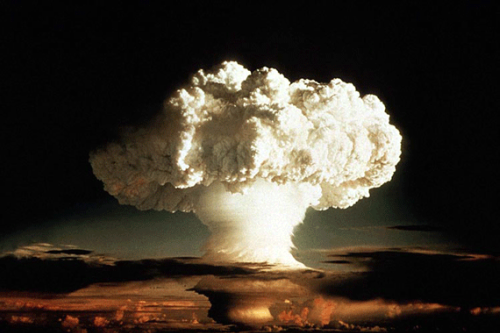40k Lore: The End Times

Let’s talk about the 800 pound gorilla in the collective “room” of the 40k universe; the End Times.
Ok, so perhaps that’s a bit simplistic and ominous, but the fact is that the idea of a final battle or prophesy of the end of things is present in several forms across many of the major factions. These concepts share some similarities and some notable differences that tend to be dictated by their specific racial or organizational perspectives. While there are certainly completely mundane possibilities for the End in the 40k universe (the Tyranids and Necrons for instance…) for now let us concentrate on the fundamental conflict between Chaos and reality itself. While all of the powers, great and small, of the 40k universe will undoubtedly have their roles to play in this conflict, the positions of some are not well known. So let’s take a look the three most pivotal factions in this existential conflict; the Eldar, the Imperium of Man, and the forces of Chaos.
The Eldar: While the beliefs of the Eldar are rich, and theirs is at once the most ancient and the most prescient of all the mortal races, little is known to us of the specifics of their beliefs on the End Times. What we do know the end of all things will be in the form of Rhana Dandra, the last battle. As might be expected from the fatalistic race, their last battle entails the destruction of what remains of Elder culture. At Rhana Dandra, all of the Phoenix Lords, summoned together by Fuegan (himself doomed to be the last to fall), will fight together in the final conflict against Chaos, and each will fall in turn. In the end, it is said that the Eldar (with the possible exception of the Exodites and the Harlequins) will be destroyed. And yet even in the hour of their final destruction, the dying race will have its ultimate victory, as the souls of the fallen will give new life to the as yet unborn deity Ynnead, God of Death, who will at last have the power to destroy the Eldar’s racial nemesis Slaanesh, the final victory of the dead species over their most hated foe from beyond its collective grave.
The Imperium: The powers that be in the Imperium strongly promote the ideal of the status quo. They maintain that the Imperium is eternal, invincible, and unending. Nevertheless the sense seems to have been developed there will be a final confrontation and that the Emperor will vanquish all their foes. In addition there has developed a sense that the heroes of the Imperium who have perished (notably the Primarchs) sit at His side in the afterlife, and that they will somehow fight alongside him when the time comes. While seemingly farfetched, it is notable that similar philosophies are echoed by one of the most powerful factions in the Inquisition; the Thorians. They hold that the return of the Emperor, in one form or another, is not only possible, but a given eventuality, and they actively seek to bring this occurrence about.
This is also reflected in the specific faith and legends of the Astartes, many of whom believe that their Primarchs will return to fight with them against the enemies of Man in the final hour. Notable amongst these beliefs are the legendary prophesies of the Space Wolves, whose Primarch Leman Russ told them that he would return to fight beside them during “the Wolf Time” when the great heroes of the Imperium will overthrow their foes. The Salamanders have a similar belief in the eventual return of their Primarch to lead them when they prove their worth by recovering his nine hidden artifacts. Among the Blood Angels the heroic death of their Primarch is a matter of record, and yet their legends tell of him appearing in visions to his sons in times of their greatest need (such as to the man once known as Brother Calistarius, and now as Mephiston, the Lord of Death) to guide them, and the visions of their fallen Primarch himself hint of a time of final conflict to overshadow all other wars. Among the insular and mysterious Dark Angels it is a secret to all but the highest of the Innner Circle that a prophecy of the Fallen Angel Luthor, once right hand of the Lion and the man who sundered the Legion during the Heresy, imprisoned deep within The Rock to this day tells that the Lion was taken by the Watchers in the Dark, to be hidden and returned in the time of greatest darkness to give his aid in the final conflict with Chaos. Indeed, for ten thousand years Luthor has spoken no words but these, no matter what the question put to him, and what is unknown to even the most illuminated of the Inner Circle is that the Lion himself slumbers in a timeless sleep at the very heart of The Rock, ready to return as foretold.
Even amongst the most stolid Chapters there are hints of their Primarch’s fated return. The body of Roboute Guilliman is said to be healing from the mortal wounds inflicted by his former brother Fulgrim, despite the fact that this is manifestly impossible within the stasis field in which his body rests. A near forgotten legend of the Imperial Fists holds that Rogal Dorn did not perish aboard the Sword of Sacrilege as it is said, but that he recovered from his wounds and, stricken by grief at having watched first his beloved Father, and then over the millennia all of his brother Primarchs fall or vanish, and not wanting the veneration and worship he received from the common citizenry, he retired from sight to dwell in seclusion at his Father’s side until the return he believed would someday happen.
Evidently the belief exists among humanity, in one form or another, and whether vocalized or not, that there will come a time where the Emperor, together with his Sons and mightiest of heroes, will return to lead humanity in the final conflict. It goes without saying that the Imperium does not doubt that the Emperor’s final victory is the only possible outcome in this conflict.
Chaos: Due to its, well… chaotic, nature, there exists no formal unifying vision or formula for the final battle among the Ruinous Powers. Rather the theme differs depending on which of the Dark Gods one follows. To Khorne, the ultimate conflict and eventual triumph of Chaos of the mortal realm will be a cataclysmic war of Chaotic ascendance. To Slaanesh it is the eventual corruption and debasement of mortals themselves, until all descend into the depths of depravity and debauchery, embracing Chaos as the ultimate of desires which has been denied for too long, a moral infection and subsuming if you will of mortal existence itself. To Tzeentch it will be the simultaneous culmination of all its impossibly labyrinthine and well ordered schemes, which will (paradoxically) bring about a state of pure flux, of change as the only constant. And to Nurgle it is nothing more or less than the inevitability of entropy finally overtaking reality, the ultimate and inevitable death, withering, and stagnation of the universe itself as it must come to pass. It is perhaps unsurprising that these models are themselves contradictory; the victory of Chaos in any form is a victory for Chaos as a whole, and yet they are mutually exclusive and the occurrence of any one would mean the failure of all the others, this is the fundamental paradox at the heart of Chaos.
Of course, the mortal followers of the Ruinous Powers have their own visions of their final triumph, and these are themselves as varied as those who worship Chaos. Some cults believe in the return of Horus, Champion of Chaos, to finish what he began ten thousand years before. Indeed, so pervasive was this concept that a flawed attempt at his artificial resurrection through cloned tissue was attempted, drawing the undying ire of Horus’s inheritor, the Arch-Fiend Abaddon the Despoiler, who destroyed both the attempts and the body of his fallen idol and mentor, which he had himself rescued from Imperial hands after the climactic confrontation of the Heresy. Many, including the Warmaster of Chaos himself, believe that Abaddon is destined to finish what his predecessor began all those millennia ago and topple the Imperium, and eventually the mortal galaxy in its entirety in vengeance for what was denied them in the distant past.
Whatever form the final conflict for the fate of reality may take, the one thing we can say for sure is that this fate is looming ever larger on the collective horizon of the 40k universe, the signs and portents abound; the growing strength of the slumbering Ynnead, the slow failure the impossibly arcane mechanisms of the Golden Throne after ten millennia, or disturbing near success of the 13th Black Crusade of Chaos. Sometime in the perhaps not-so-distant future the beings of this universe, both mortal and otherwise, will have to contend with their ultimate fate…
References:
Warhammer 40,000 rulebook
Codex: Space Marines
Codex: Blood Angels
Codex: Dark Angels
Codex: Space Wolves
Codex: Eldar
Codex: Chaos Space Marines
Codex: Chaos Daemons
Index Astartes
What do you think of the End Times? What do they mean and who will triumph? Have you read other visions of them? Are they really upon us, or is it all just superstition on behalf of the people of the Grim Dark future?
If you have a favorite corner of the 40k lore that would like to see featured, or just a lore question you think would interest the community, let me know, you can even PM me on the forum if you like. New ideas are always welcome.



